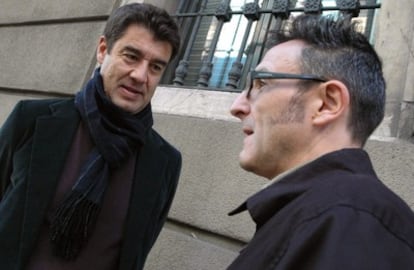Swiss border crossings
Two filmmakers duke it out over European immigration, past and present
On one side of the table, Fernand Melgar: Swiss filmmaker of Spanish parentage who caused a stir in his country this summer with Vol spécial, a documentary about an internment center for immigrants about to be sent back home, handcuffed and hooded, on special flights. On the other side, Carlos Iglesias: director of Un franco, catorce pesetas (2006), a look back at the Spanish migration to Switzerland of the 1960s. EL PAÍS got them together at the recent Gijón Film Festival and watched the sparks fly as they chatted about immigration in Switzerland and Europe.
Fernand Melgar. Before starting I have to confess that the owner of the bakery where I go for breakfast every morning was your neighbor when you were a child in Uzwil [Switzerland]. I think she even rented her house to you during the shooting of Un franco, catorce pesetas. She prodded me into seeing your film.
Carlos Iglesias. Amazing! She sent me an email telling me she had been moved by the story. I made that film because I wanted to say that not everything is rosy, that immigration always creates a yearning for what you leave behind. Now I want to direct [...] the second part. [...] It will be a comedy that takes place eight years later that shows them coming back to Switzerland as tourists, and with money.
F.M. Your Un franco, catorce pesetas seems a bit of an idealization of the Switzerland of the 1960s. [...] It's not, for example, the immigration that my father knew, perhaps because you dealt with the golden years, from 1960 to 1966. But I insist that immigration is made up of individual stories, that one can't generalize. Your family was lucky. It was a golden period when Swiss bosses were looking for labor in southern Europe. My father, an electrician, earned a third of what he should have earned, as did my mother, a seamstress. It was generalized.
C. I. No, no, it wasn't like that, they were paid equally.
F. M. No, I have a lot of testimonies. Even though the salaries were still better than those they would have received in Spain. I don't think they thought about returning. At the end of the 1960s, the leader of the ultra-right wing National Action party tried to expel the foreigners, around 300,000 people. And that was when we were in the best economic moment. And little by little, their hearts closed, they moved from being optimists in a country that seemed wonderful to longing to go back. The funny thing is those initiatives were thwarted by the right, since it was the bosses who needed those workers. Today those who are most hostile to immigrants are also immigrants, but established ones, because they are scared of losing their status.
C. I. That is true. But I have done reports and swapped facts with hundreds of people from my area, and they all earned the same, even though it is true they worked in industry. And they knew because some of them were even in charge of handing out the weekly pay. Today in Spain, if you're an illegal immigrant, you earn just a third of what you should, and if you have papers, half. And they gave that figure on Telemadrid, a right-wing channel. In contrast to what happened to us, today's immigrants want to stay there. Up to half a million Spanish immigrants came to be in Switzerland and only a few stayed. Many of them illegally, by the way, although most people have forgotten that detail. I understand that you live in Switzerland and you have to be critical of your people. I live in Spain and I must criticize mine, and it annoys me that having gone through all these problems, we are still less welcoming than they were with us. People who were slaves ? and not citizens ? in the past, without social justice, end up grinding down their inferiors.
F. M. In Switzerland we invented a devilish trick for temporary work permits: 300,000 people came for nine months every year without being allowed to settle or hold possessions. They were cheap slaves. The system was stopped in 2004 because free circulation in Europe began. Today there are 300,000 illegal immigrants, like those in my film, who even paid taxes, and are exploited. It is the great hypocrisy of society, to say that the problems were created by them.
C. I. There is a greater hypocrisy. How far are we going to continue like this? [...] Are we willing to open up the borders? [...] Who is going to give up their cellphone, their second TV for them?
F. M. And we need them: immigrants to look after our old people, to pay our taxes as our nations get older, immigration to rejuvenate our blood.

Tu suscripción se está usando en otro dispositivo
¿Quieres añadir otro usuario a tu suscripción?
Si continúas leyendo en este dispositivo, no se podrá leer en el otro.
FlechaTu suscripción se está usando en otro dispositivo y solo puedes acceder a EL PAÍS desde un dispositivo a la vez.
Si quieres compartir tu cuenta, cambia tu suscripción a la modalidad Premium, así podrás añadir otro usuario. Cada uno accederá con su propia cuenta de email, lo que os permitirá personalizar vuestra experiencia en EL PAÍS.
¿Tienes una suscripción de empresa? Accede aquí para contratar más cuentas.
En el caso de no saber quién está usando tu cuenta, te recomendamos cambiar tu contraseña aquí.
Si decides continuar compartiendo tu cuenta, este mensaje se mostrará en tu dispositivo y en el de la otra persona que está usando tu cuenta de forma indefinida, afectando a tu experiencia de lectura. Puedes consultar aquí los términos y condiciones de la suscripción digital.








































